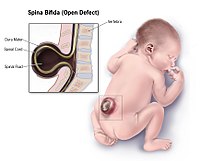Isolated Spina Bifida

A group of rare neural tube defect disorders characterized by improper closure of the spinal column during embryonal development, not associated with other major congenital malformations nor ventriculomegaly. The extent of the closure defect may vary, ranging from spina bifida occulta, in which the site of the lesion is not exposed (e.g. an isolated posterior vertebral arch defect), to spina bifida aperta, in which the lesion may be conformed of proturding spinal cord and meninges (myelomeningocele) or meninges exposure only (meningocele), with or without a proturding sac at the site of the lesion, to the most severe defect which includes total exposure of the spinal cord along its full length (rachischisis). Depending on the type, size and site of the defect, severe morbidity, typically inlcuding motor, sensory and sphincter dysfunction, and mortality may be associated. Spina bifida occulta may be asymptomatic.